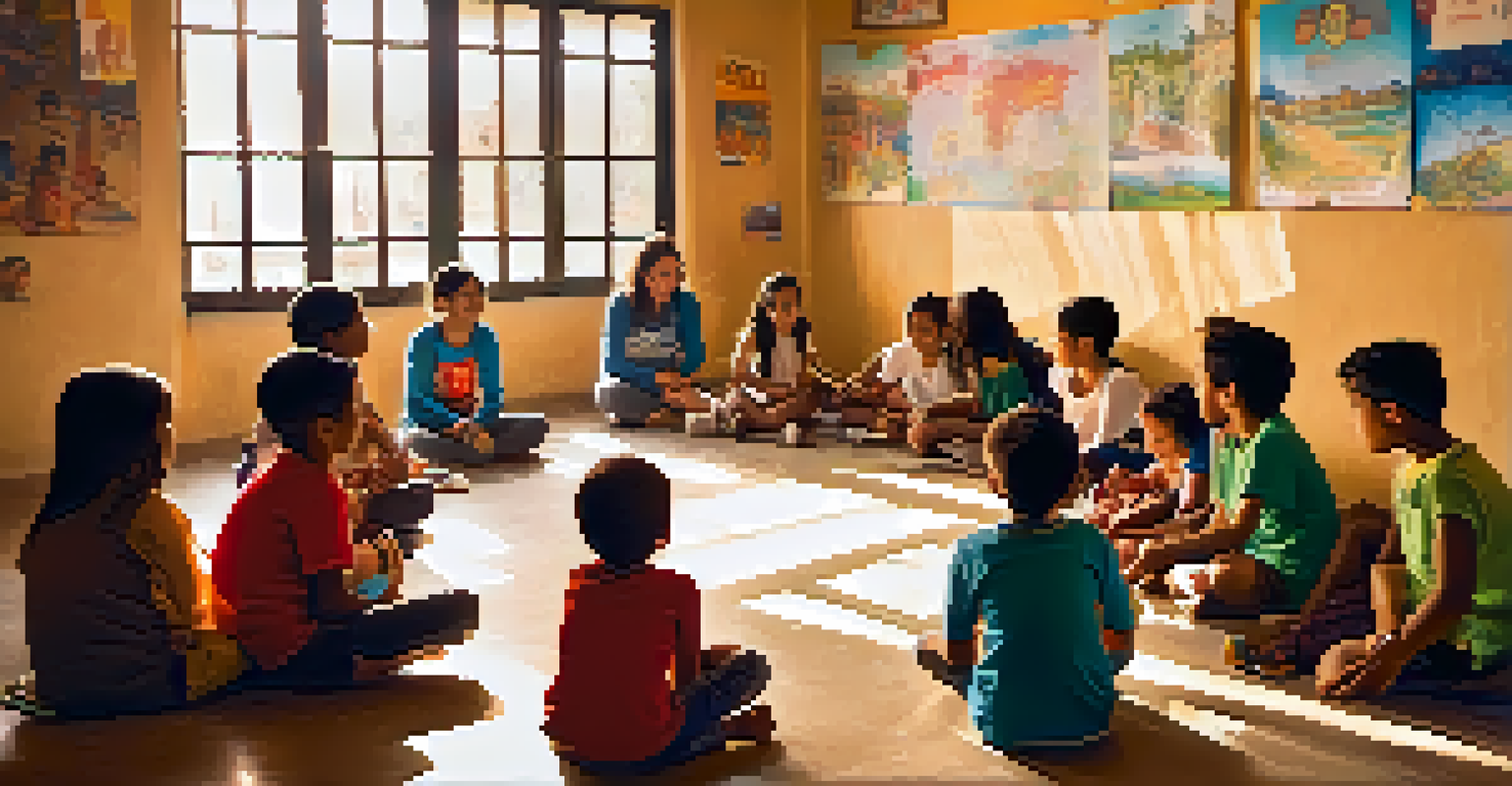The Impact of Volunteer Tourism on Spanish Communities

Understanding Volunteer Tourism and Its Growth in Spain
Volunteer tourism, often called 'voluntourism', combines travel with volunteering, allowing tourists to contribute to local communities while exploring new cultures. In Spain, this trend has gained traction as travelers seek meaningful experiences that go beyond traditional sightseeing. By engaging in projects that support local needs, volunteers not only help communities but also create personal connections and memorable experiences.
Volunteering abroad is not just about giving back; it's about building bridges of understanding and creating lasting relationships.
Spain's rich history, diverse landscapes, and vibrant cultures make it an attractive destination for volunteer tourists. From coastal conservation projects in Costa Brava to helping underprivileged communities in Andalusia, the options are varied and impactful. This growing interest in volunteering while traveling highlights a shift in how people view tourism, prioritizing authenticity and contribution over mere leisure.
As awareness of social and environmental issues increases, more travelers are looking for ways to make a positive impact. Volunteer tourism in Spain not only addresses local challenges but also promotes sustainable practices, ensuring that both communities and tourists can benefit in the long term. This evolving landscape presents opportunities for both visitors and hosts to learn from each other.
Economic Benefits of Volunteer Tourism in Local Communities
One of the most significant impacts of volunteer tourism is its potential to boost local economies. Volunteers often contribute financially by paying for programs, accommodations, and meals, which supports local businesses. This influx of funds can help create jobs, improve infrastructure, and promote entrepreneurship in areas that might otherwise struggle economically.

Moreover, volunteers often engage in skill-sharing, bringing new ideas and expertise that can help local residents develop sustainable practices. For example, a volunteer with marketing skills might help a small local business enhance its online presence, leading to increased sales. These exchanges foster a sense of community and empowerment, as locals learn to leverage their resources effectively.
Volunteer Tourism Boosts Local Economies
By paying for programs and engaging in skill-sharing, volunteer tourists help create jobs and support local businesses.
Additionally, the presence of volunteer tourists can attract further investment and interest in the area. As these travelers share their experiences, they become ambassadors for the region, encouraging others to visit and participate in similar programs. This creates a ripple effect, where the economic benefits of volunteer tourism extend well beyond the initial engagement.
Social Impacts: Strengthening Community Bonds
Volunteer tourism fosters social cohesion by bringing together individuals from different backgrounds and cultures. When volunteers work alongside locals, they create bonds that transcend language and cultural barriers, promoting understanding and friendship. This interaction can lead to lasting relationships and a greater appreciation of diversity within the community.
The best way to find yourself is to lose yourself in the service of others.
Additionally, these projects often focus on addressing social issues, such as education and healthcare, which can enhance the quality of life for residents. For instance, a volunteer teaching English to children can not only improve their language skills but also open doors to future opportunities. Such initiatives empower local communities and inspire a sense of collective responsibility.
As volunteers immerse themselves in local life, they often become advocates for the communities they serve. By sharing their experiences and raising awareness about the challenges faced by these communities, they can attract further support and resources. This creates a positive feedback loop, where increased attention leads to more opportunities for both volunteers and locals.
Cultural Exchange: Enriching Lives on Both Sides
Volunteer tourism provides a unique platform for cultural exchange, allowing both volunteers and locals to learn from each other. Volunteers gain insights into Spanish traditions, cuisine, and daily life, while locals benefit from fresh perspectives and global ideas. This mutual exchange enriches the experience for everyone involved and promotes cultural appreciation.
For example, a volunteer participating in a community gardening project may introduce sustainable practices learned from their home country, which locals can adapt to their needs. This exchange of knowledge can lead to innovative solutions for common challenges, such as food security or environmental conservation. Such collaborations foster creativity and resilience within communities.
Cultural Exchange Enriches Experiences
Volunteer tourism fosters mutual learning, allowing volunteers and locals to share traditions and innovative practices.
Furthermore, these interactions often challenge stereotypes and misconceptions, fostering a greater understanding of each other's lives. As volunteers return home, they share their stories, highlighting the richness of the culture they experienced. This not only promotes Spain as a destination but also encourages others to engage in volunteer tourism, further bridging cultural gaps.
Environmental Impact: Conservation Efforts through Tourism
A significant aspect of volunteer tourism in Spain is its focus on environmental conservation. Many volunteer projects are centered around preserving natural habitats and wildlife, which is crucial in a country known for its biodiversity. By participating in these initiatives, volunteers contribute directly to the protection of Spain's unique ecosystems.
For instance, volunteers may engage in beach clean-ups, tree planting, or wildlife monitoring, which not only helps the environment but also raises awareness about sustainability among local communities. This engagement can lead to long-term environmental benefits, as locals adopt more sustainable practices in their daily lives. Volunteers often leave behind a legacy of stewardship that continues even after they depart.
Moreover, the emphasis on conservation can help promote eco-tourism, attracting visitors who are passionate about preserving the environment. This shift towards responsible tourism can create a sustainable economic model that balances the needs of local communities with environmental protection. In this way, volunteer tourism becomes a catalyst for positive change.
Challenges Faced by Volunteer Tourism Initiatives
While volunteer tourism has many benefits, it is not without its challenges. One major concern is the potential for 'voluntourism' to inadvertently create dependency rather than empowerment. If projects are not well-planned or executed, they may not address the root causes of local issues, leading to short-term solutions that fail to create lasting change.
Additionally, the influx of volunteers can sometimes strain local resources and infrastructure, especially in small communities. It's essential for organizations to assess the community's capacity to host volunteers and to ensure that their contributions are aligned with local needs. Collaboration with local leaders and residents is key to developing effective and sustainable projects.
Focus on Environmental Conservation
Many volunteer projects in Spain prioritize ecological efforts, helping to preserve biodiversity and promote sustainable practices.
Lastly, transparency and ethical considerations must be prioritized. Ensuring that volunteer programs are legitimate and that funds are used appropriately can build trust between volunteers and communities. By focusing on ethical practices, we can create a more positive and impactful experience for everyone involved.
Future Trends in Volunteer Tourism in Spain
As the world becomes more interconnected, the future of volunteer tourism in Spain looks promising. With a growing awareness of social and environmental issues, more travelers are seeking opportunities to make a difference while exploring new destinations. This trend is likely to continue, with an emphasis on responsible and sustainable tourism practices.
Innovations in technology and communication will also play a significant role in shaping the volunteer tourism landscape. Online platforms that connect volunteers with local organizations can streamline the process, making it easier for travelers to find meaningful opportunities. This increased accessibility can lead to a more diverse range of volunteers and projects.

Furthermore, as communities adapt to the needs of volunteer tourists, we may see a shift towards more community-led initiatives. Empowering locals to take charge of their development can lead to more effective and relevant projects. By prioritizing collaboration and mutual benefit, volunteer tourism can continue to thrive in Spain while creating lasting positive impacts.